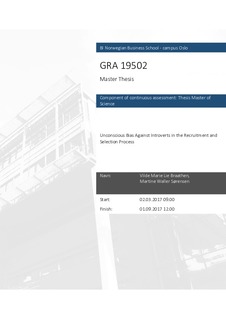| dc.description.abstract | The current study is an attempt to expand upon the limited research area of
unconscious bias against certain personality types that may emerge during the
employment interview. We proposed that an extraverted personality type would be
favoured in the employment interview, and this was based on the notion that the
interview situation, which is inherently a social interaction, is arguably better suited
for an extraverted personality type than an introverted personality type. By means
of a quantitative study - in which data was collected through an online survey, and
then analysed using multivariate analysis of variance - we attempted to examine the
extent to which such an unconscious bias against the introverted personality type
actually exists, and whether degree of interview structure can be employed as a
means to reduce the effect of such an unconscious bias. Moreover, given that HR
and recruitment personnel are trained to ignore irrelevant cues about personality,
we also wanted to examine this further by comparing the ratings of a HR and
recruitment personnel group with a general population group. The results of the
study gave no direct indication of the existence of such an effect of unconscious
bias against introverts; however, we found evidence suggesting that the use of a
structured interview was beneficial regardless of personality type. As for the two
experimental groups, the results indicated that the HR and recruitment personnel
are more balanced in their ratings across the experimental conditions, whereby the
general population seem more likely to be influenced by irrelevant personality cues.
The implications of the study for theory and practice, potential weaknesses, and
suggestions for future research are discussed.
Keywords: unconscious bias, personality, personality attributions, social
stereotypes, Five-Factor Model, introversion, extraversion, employment interview,
structured interview, unstructured interview, job analysis, recruitment and
selection, impression management | nb_NO |
